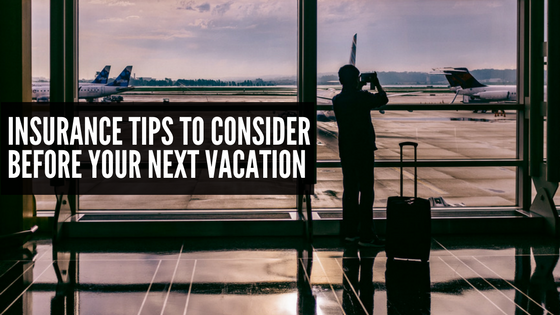Insurance Tips To Consider Before Your Next Vacation

Download this episode:
On iTunes | On Stitcher
Are you planning a getaway over Labor Day weekend? In our latest podcast episode, we discuss the insurance and safety tips to consider before you pack your bags and hit the road.
Protect your home while you’re away.
Unplug any appliances that do not need to stay plugged in, such as toasters, coffee makers, phone chargers, televisions and computers. Plugged-in appliances are known to cause home electrical failure fires.
Ask a friend or neighbor to stop by the house randomly, so they don’t establish a pattern that would-be thieves could use to their advantage. Ask them to check the mail, pick up packages from the doorstep, and take fliers from the door.
If you are going away for a long time, reduce the risk of floods or leaks by turning off the water to your washing machine, dishwasher and toilets.
Avoid posting on social media while away on vacation. Many thieves pick their targets based on social media activity.
Consider travel insurance for costly or long trips.
One in six Americans has had their travel plans impacted by medical conditions, natural disasters or mechanical or carrier-cause problems, according to the US Travel Insurance Association. Of those affected, only one in five had travel insurance.
If you are traveling a long distance, taking more than a brief vacation, OR taking a costly trip, travel insurance may provide you with protection and peace of mind.
Here are some circumstances travel insurance may cover:
Trip cancellation. This is the most common concern for most travelers. Typically, travel insurance can reimburse you for pre-paid, nonrefundable expenses if you need to cancel your trip ahead of time.
Each insurance company will provide its own list of covered reasons for trips cancellation. However, common reasons may include:
- You are laid off from work or required to work
- A terrorist incident occurs in your destination city
- You are summoned for jury duty
- Your travel destination has been damaged by a natural disaster
Trip interruption. If a covered event occurs while you are on a trip and you are required to return home, travel insurance may reimburse you for the lost portion of the trip. It may also cover additional expenses for the last-minute flight home.
Medical cancellation, interruption or evacuation. If you must cancel or cut your trip short due to the sickness, injury, or death of you, a family member or traveling companion, you must purchase this specific coverage.
Medical treatment or evacuation while abroad can be costly, and many people mistakenly assume they are covered for these medical emergencies. Examine your health insurance policy to determine what coverage, if any, you have abroad, and supplement with a travel insurance policy to cover any gaps.
Tune up your auto insurance before you hit the road.
Review your auto insurance policy prior to travel. Double-check your collision and liability coverage prior to travel. If you don’t already have roadside assistance coverage, ask your auto insurance agent if you can add it to your policy.
If you’re leaving the state, ensure that your auto insurance coverage is likely valid in another state, even if your insurer does not sell there.
Consider rental car insurance. If you’re renting a car for your trip, making sure that you have the right insurance coverage can be tricky. Car rental places will encourage you to get insurance through the, but you may not need it. Ask your insurance agent how your specific policy covers rental cars before you purchase additional coverage.



